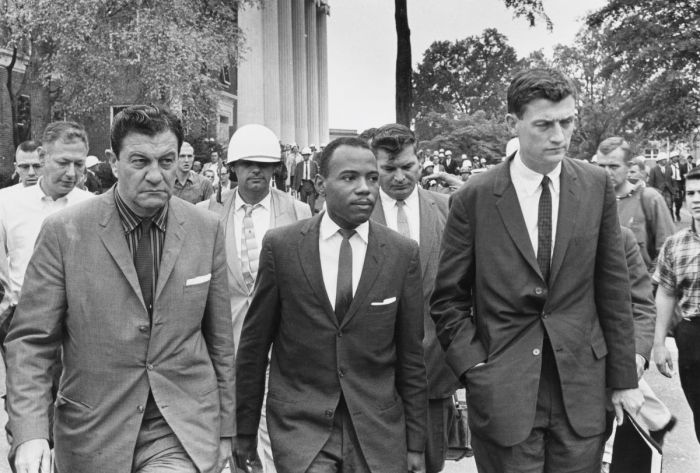James Meredith: A truly American story?

In the past fortnight, the University of Mississippi welcomed back perhaps its most famous graduate (with the possible exceptions of Archie and Eli Manning and the author John Grisham).
James Meredith, the now 89-year-old activist, had been invited back to campus to celebrate his historic enrollment at “Ole Miss” in the fall semester of 1962.
The University’s Chancellor, Glenn Boyce, welcomed Mr. Meredith along with the Meredith family as well as many other distinguished guests. Meredith was the first African American to enroll at the University of Mississippi when he matriculated in 1962 and the first Black person to graduate from the university in 1963. Meredith had served 10 years in the U.S. Air Force (1951-1961) and had attended the historically black Jackson State College after leaving the Air Force, before enrolling at Ole Miss.
During this most recent visit to his alma mater, Meredith received a number of honors and awards. Ole Miss’s Chancellor awarded Meredith the “Mississippi Humanitarian Award,” one of the University’s most prestigious honors, only awarded 4 times in the last two decades. The University also gave Meredith a significant financial gift to help fund the proposed “James Meredith Museum and Bible Society.”
The University’s College of Liberal Arts announced the “James Meredith Changemaker Award,” which will be given at graduation each year to a graduating student.
The university also announced the creation of the James Meredith Speaker Series, which will mark the anniversary of his enrollment. The university also announced an annual James H. Meredith Legacy Award and the endowment of a James H. Meredith Legacy Scholarship Fund.
The city of Oxford Mississippi also presented Meredith with a resolution proclaiming Oct. 1, the date of his historic enrollment in 1962, as “James Meredith Day.”

Why all of this ceremony and commemoration for Mr. Meredith? Well, the last honor given to Mr. Meredith upon his return on the 60th anniversary of his historic enrollment provides the answer. The director of the U.S. Marshals Service honorably deputized Meredith into the Marshals service, a singular and perhaps, unique honor. Ronald Davis, the director of the Marshals Service, said that presenting this to Meredith was “probably the greatest honor of my tenure as director.”
Why U.S. Marshals you may ask? Unfortunately, it took several hundred U.S. Marshals (some of whom were present in the audience) to escort Mr. Meredith to campus and to protect his physical safety. Mr. Meredith, inspired by President Kennedy’s inaugural address, had been moved to attend the University of Mississippi, which was rigidly racially segregated in 1962. The federal government enforced the federal law, and Attorney General Robert F. Kennedy persuaded his brother, President John Kennedy, to federalize the Mississippi National Guard to enforce the court order and use the U.S. Marshals as well.
Mr. Meredith’s enrollment caused significant rioting and violence at the University in Oxford itself, and two people died. Among the honored guests at the celebration last week was Kathleen Kennedy Townsend, RFK’s daughter.
In his speech, Mr. Meredith, before a cheering crowd, acknowledged the statue honoring him on campus and spoke of his “final mission” to “spread Christian teachings through the proposed “James Meredith Museum and Bible Society.”
James Meredith’s life has been characterized by his Christian faith, as signified by the title of his autobiography, A Mission from God: A Memoir and Challenge (2012).
In his speech last week, Meredith said, “America ain’t automatically here to stay. We’ve got to do some right things.”
I had just entered the 10th grade when James Meredith enrolled at Ole Miss. I don’t think it is an exaggeration to say that circa 1962-1965 the white political establishment in Mississippi was in a state of semi-insurrection against the government of the United States. It took forceful police and military action to guarantee Mr. Meredith’s civil rights were not abridged, not to mention his life. Mississippi was perhaps the most racially segregated state in the union. It must be remembered that Mississippi was also the site of the 1964 murder of the three civil rights workers who were then buried under a dam outside Philadelphia, Mississippi – ironically the “city of brotherly love.”
James Meredith summoned up the courage to confront and defeat, with the federal government’s protection, the white supremacists, the KKK, and the White Citizenship Councils – evil but powerful foes. I thank God that James Meredith and so many others, black and white, were willing to put their lives on the line to challenge all of America to live up to the promises of our nation’s founding documents – “all men are created equal.”
James Meredith is an American hero. In 1966 he began a solitary “march against fear” from Memphis to Jackson, Mississippi. He was shot by a sniper and was hospitalized until he recovered. Other civil rights protesters took his place and completed the march.
From the perspective of the 60th anniversary of Meredith’s enrollment at Old Miss, great progress has undeniably been made.
Mississippians of all ethnicities are to be commended and all Americans should draw encouragement from the progress that has been made and use that encouragement to inspire us to move forward to even greater progress in the future.
Statistically speaking, Mississippi’s population is presently 58% White, 37.68% Black, 1 % Asian, and .47% Native American. However, that ethnic breakdown is not reflected at his flagship university. Ole Miss undergraduate enrollment breaks down as follows: 77.3% White, and 12.1% Black. The graduate student enrollment is 68.15% White, 9.4% Black, and 11.7 International. The Ole Miss faculty is 65.6% White, and 30.9% Black.
The statistics represent significant intentional progress. However, the disparity between the population and the university’s enrollment and faculty employment is still out of balance.
As James Meredith had made the observation that we as a nation would do well to heed: “America ain’t automatically to stay. We’ve got to do some right things.”
Having lived through the Civil Rights revolution, for which I am extremely grateful, I have come to the conclusion that the law has done about all that it can do.
If we are to travel the rest of the way to the fulfillment of Dr. King’s dream of a society where we are judged by the content of our character and not the color of our skin, the light and truth of the Gospel is going to have to take us there.
That is why Jesus commanded His disciples to be salt and light. The salt of the law can change actions. Only the light of the Gospel can change attitudes. The salt of the law can change behaviors. Only the light of the Gospel can change beliefs. The salt of the law can change habits. Only the light of the Gospel can change hearts.
Let us all be about our Heavenly Father’s business.
Dr. Richard Land, BA (Princeton, magna cum laude); D.Phil. (Oxford); Th.M (New Orleans Seminary). Dr. Land served as President of Southern Evangelical Seminary from July 2013 until July 2021. Upon his retirement, he was honored as President Emeritus and he continues to serve as an Adjunct Professor of Theology & Ethics. Dr. Land previously served as President of the Southern Baptist Convention's Ethics & Religious Liberty Commission (1988-2013) where he was also honored as President Emeritus upon his retirement. Dr. Land has also served as an Executive Editor and columnist for The Christian Post since 2011.
Dr. Land explores many timely and critical topics in his daily radio feature, “Bringing Every Thought Captive,” and in his weekly column for CP.





























